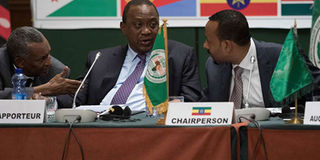Kenya-Djibouti row delays choice of new IGAD leader

President Uhuru Kenyatta (centre) at the 32nd Extra-Ordinary Summit of IGAD Assembly of Heads of State and Government in Addis Ababa, Ethiopia in 2018. Kenya and Djibouti could both miss out on the chairmanship of IGAD due to simmering differences. PHOTO | FILE
What you need to know:
- Djibouti recently lost to Kenya at an AU vote to endorse the African candidate for the UN Security Council seat.
- Somalia, which supports Djibouti for the UN seat, has also staked against Nairobi.
- The IGAD Summit will be expected to approve Dr Workneh Gebeyehu as the new executive secretary
Kenya and Djibouti could both miss out on the chairmanship of the Intergovernmental Authority on Development (IGAD) as the regional bloc seeks to resolve simmering differences between Horn of Africa countries.
In its first Ordinary Summit in nearly 10 years, representatives of IGAD members are sitting in Addis Ababa on Thursday and Friday to determine who will chair it next.
It is also expected to confirm Ethiopian diplomat Workneh Gebeyehu as the new executive secretary, according to a programme released on Thursday morning.
NEW STRUCTURE
The programme indicated that the council of ministers will first meet on Thursday morning to nominate the country that will take the chairmanship as well as vote on a new organisational structure that will make the body to be more responsive to local challenges.
But differences between Kenya and Djibouti have prevented the bloc from deciding, on consensus, who becomes the next to chair IGAd after Ethiopia’s Prime Minister Abiy Ahmed.
On Wednesday, a diplomat said that both Somalia and Djibouti, who have been opposed to Kenya taking over the chairmanship, have not relented, meaning a new country could take the position as a compromise.
COMPROMISE CHAIRPERSON
“The seat could go to Uganda or Sudan,” said the official, indicating that the compromise chairperson will be one way to avoid any falling-out.
Djibouti recently lost to Kenya at an African Union (AU) vote to endorse the African candidate for the UN Security Council seat.
But the country has stuck in the race, launching campaigns and accusing the AU of not following proper procedure to endorse a candidate.
Somalia, which supports Djibouti for the UN seat, has also staked against Nairobi.
Until November, there had been simmering diplomatic tensions between Mogadishu and Nairobi after the former sued at the International Court of Justice seeking to have a maritime boundary between them redrawn.
In early November, Presidents Uhuru Kenyatta and Somalia’s Mohamed Abdullahi Farmaajo agreed to restore all bilateral agreements, in spite of the case due in June 2020.
IGAD SUMMIT
The IGAD Summit, composed of heads of state and governments, will be expected to approve Dr Workneh Gebeyehu, a former Foreign Minister of Ethiopia, as the new executive secretary.
He had been appointed earlier last month in what Dr Abiy claimed followed “consensus.”
Dr Workneh has already taken over from Kenyan Mahboub Maalim.
But he will face the challenge of unifying the bloc’s members, bring in Eritrea and raise funds for a bloc that has often relied on donors for most of its programmes.
ERITREA
Eritrea, a founder member of IGAD, has often been on and off, suspending itself in 2007 before returning in 2016 but still failing to attend most meetings.
But it now appears a planned swap between Kenya and Ethiopia for the chairmanship roles may not go through.
The last such ordinary summit happened in 2010 when Kenya’s Mwai Kibaki handed chairmanship to then prime minister of Ethiopia Meles Zenawi. Since then, Ethiopia has continuously held the chairmanship through its three successive Prime ministers.
One argument fronted by both Addis Ababa and Nairobi’s domination of the bloc is that they are the largest contributors to the IGAD budget and currently have no arrears. The two pump in at least USD2.7 million each per year.
Formed in 1996, IGAD superseded the Intergovernmental Authority on Drought and Development (IGADD) which was founded in 1986 to deal with natural disasters.
The new bloc was supposed to generate a regional identity and be in charge of resolving regional crises from civil wars to natural disasters and enhance economic and regional integration.





